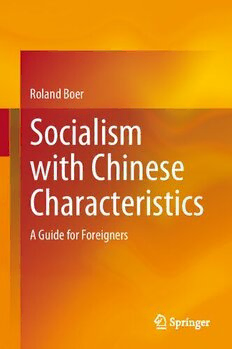
Socialism with Chinese Characteristics: A Guide for Foreigners PDF
Preview Socialism with Chinese Characteristics: A Guide for Foreigners
Roland Boer Socialism with Chinese Characteristics A Guide for Foreigners Socialism with Chinese Characteristics Roland Boer Socialism with Chinese Characteristics A Guide for Foreigners RolandBoer SchoolofMarxism DalianUniversityofTechnology Dalian,China ISBN978-981-16-1621-1 ISBN978-981-16-1622-8 (eBook) https://doi.org/10.1007/978-981-16-1622-8 ©TheEditor(s)(ifapplicable)andTheAuthor(s),underexclusivelicensetoSpringerNatureSingapore PteLtd.2021 Thisworkissubjecttocopyright.AllrightsaresolelyandexclusivelylicensedbythePublisher,whether thewholeorpartofthematerialisconcerned,specificallytherightsoftranslation,reprinting,reuse ofillustrations,recitation,broadcasting,reproductiononmicrofilmsorinanyotherphysicalway,and transmissionorinformationstorageandretrieval,electronicadaptation,computersoftware,orbysimilar ordissimilarmethodologynowknownorhereafterdeveloped. Theuseofgeneraldescriptivenames,registerednames,trademarks,servicemarks,etc.inthispublication doesnotimply,evenintheabsenceofaspecificstatement,thatsuchnamesareexemptfromtherelevant protectivelawsandregulationsandthereforefreeforgeneraluse. Thepublisher,theauthorsandtheeditorsaresafetoassumethattheadviceandinformationinthisbook arebelievedtobetrueandaccurateatthedateofpublication.Neitherthepublishernortheauthorsor theeditorsgiveawarranty,expressedorimplied,withrespecttothematerialcontainedhereinorforany errorsoromissionsthatmayhavebeenmade.Thepublisherremainsneutralwithregardtojurisdictional claimsinpublishedmapsandinstitutionalaffiliations. ThisSpringerimprintispublishedbytheregisteredcompanySpringerNatureSingaporePteLtd. The registered company address is: 152 Beach Road, #21-01/04 Gateway East, Singapore 189721, Singapore ForDomenicoLosurdo(1941–2018) Preface LetmebeginwithaquotationfromMaoZedong: Someforeignerssaythatourideologicalreformisbrainwashing.AsIseeit,theyarecorrectin whattheysay.Itiswashingbrains,that’swhatitis!Thisbrainofminewaswashedtobecome whatitis.Afterjoiningtherevolution,itwasslowlywashed,washedforseveraldecades. WhatIreceivedbeforewasallbourgeoiseducation,andevensomefeudaleducation.(Mao Zedong,quotedinShao2017,2)1 MaowasspeakingtoChinesestudentsstudyinginMoscowin1957,buthiswords arestillresonanttoday.Formeatleast,thein-depthstudyofChineseMarxism,of socialismwithChinesecharacteristics,hasrequiredawashingofmybrain,awashing thathastakenadozenyearsormore.Why?WhenIfirstcametoChina,Ithought Iwasopen-minded,thoughtthatIdidnotassumetheframeworksandassumptions with which I had been brought up and educated. How wrong I was. Like other foreigners,IhaddevelopedanopinionaboutChinathatwasquiteerroneous.Thisis particularlysoforthosefromthesmallnumberofcountriesthatmakeupthe‘West’ (containingabout14%oftheglobalpopulation).Ihavefoundthatthosewhohave grownupinsocialistcountries—pastandpresent—finditmucheasiertounderstand socialismwithChinesecharacteristics.Thisisalsothecaseforthemanywhocome from developing countries, for there too is a living memory of the experience of colonialdepredationatthehandsofthe‘West’.Soifyouarelikeme,havingbeen brought up and educated in one of the few Western countries, then you may well need to engage in a process of washing your brain so as to be able to understand socialismwithChinesecharacteristics,orsinifiedMarxism. Another way of putting it is ‘liberating thought’, a term that became a central feature of Deng Xiaoping’s tenure and crucial in the launching the Reform and Opening-Up.ForDeng,liberatingthoughtentailedliberationfromolddogmasand 1Tosetthecontext:thetextIhavequotedcomesfromcommentsMaomadeontheeveningof 17 November, 1957. Mao had led a delegation to Moscow, from 2 to 21 November, 1957, for a celebration of the fortieth anniversary of the October Revolution, and for two congresses of CommunistandWorkers’Parties.Healsoengagedinawhirlwindofotheractivities.Aftermuch anticipation,MaoarrivedatMoscowUniversityontheeveningof17Novembertospeakwithand answerquestionsfrommorethan3,000ChinesestudentsstudyinginMoscow. vii viii Preface assumptions about what socialism should be and indeed what capitalism was. To be clear: this is not some liberal ‘freedom of expression’ that simply reinforces Westernliberalframeworks.Instead,theliberationofthoughtiscentraltothecorrect theoreticallineofMarxismitself:Marxismisnotadogma,butaguidetoaction,a methodforanalysisandaframework—inChina—fortheconstructionofsocialism. By now it should be obvious that I will have much to say concerning Marxism inthisbook.ThesimplereasonisthatMarxismisfrontandcentreintheChinese projectofconstructingsocialism.Socialism?Yes:Iagreewiththevastmajorityof Chinese scholars and common people—along with not a few in many other parts of the world—that the Chinese project is indeed a socialist project. Thus, if you want to understand China, you need to understand Marxism, especially Chinese Marxism.ThosewhoignoreChineseMarxismriskprofoundmisunderstandingsof Chinaanditspath.MyprimaryfocusistheReformandOpening-Up,launchedby DengXiaopingandtheCPCin1978.Iwillalsohavemuchtosayatvariouspoints on the longer Marxist tradition—especially on the development of contradiction analysisandthetheoryofsocialistdemocracy.Butmyfocusremainsthedistinctly MarxistprojectoftheReformandOpening-Up. AsIindicateintheintroductorychapter,thisbookprimarilyusesresearchunder- taken by Chinese Marxist scholars in order to understand socialism with Chinese characteristics. This research has thus far been overwhelmingly published in the Chinese language and has not been studied outside China as much it should have been studied. Although there are some notable exceptions—Domenico Losurdo, ColinMackerras,NickKnight,StefanoAzzarà,andBarrySautman—Idonotfind muchWesternmaterialonChinaparticularlyuseful.Mostoftheselatterworksfall intothetrapof‘usingWesterncategoriestounderstandChina[yixijiezhong]’.2Even more,whenanoccasionalWesternMarxistfeelscalledupontoopineaboutChina,we findthatsuchaneffort‘usesWesterncategoriestounderstandMarx[yixijiema]’.For thesereasonsandmore,itisnecessarytodeploytheextraordinarydepthandrangeof ChineseMarxistscholarshiptounderstandsocialismwithChinesecharacteristics. Many are those whom I need to thank for discussing and debating the material presented in this book. They include Colin Mackerras, Stefano Azzarà, Antonis Balasopoulos,YiannisKokosalakis,TamaraProsic,CarstenBoyerThøgersen,Sean Sayers,GeoffBoucher,JamesJuniper,and—amonglocalCPAbranchmembers— GrantOsland,PeterRønne,BrynnLewis,AndrewRayment,DarrenWard,andDave. InChina,mylongpathtounderstandingsocialismwithChinesecharacteristicshas includedvitalconversationswithYangHuilin,ZangFengyu,ZhangShuangli,Zhang Jing, Zhu Yanming, Yu Min, and more recently Hong Xiaonan, Fang Yumei, Liu Guixiang,ChenXiaogui,QuHong,andYanPing.IhopeIhavedonejusticetotheir manyinsightsandhelpfulcomments,bothwittingandunwitting.Asever,Christina 2In the first Chapter (1.4.1) I provide a typology of sub-genres of many Western works on China:secularapocalypse(‘Chinadoomer’),dystopianfiction(anditsassociated‘atrocitypropa- ganda’),ghoststory,conspiracytheory(anditsbetrayalnarrative),Orientalistmystery,andsectarian intolerance(adistinctfeatureofWesternMarxism). Preface ix Pettersonhasheardanddiscussedmostwithme,aspartofthedivisionoflabourin ourcommonproject. The book is dedicated to Domenico Losurdo, from whom I have learnt much. Althoughwemetononlyoneoccasionbeforehedied,thattimewasaweektogether inChina.Weparticipatedintwoconferences,oneinBeijingandoneinShanghai, travellingbytrainbetweenthetwocities.Duringthattime,wetalkedmuchandfound muchcommonground.Atonepoint,Losurdosaidtome:‘Youneedtobepatient; we are part of the mainstream’. Of course, our mutual appreciation of and desire tounderstandthemanydevelopmentsofMarxismfromRussiatoChina,especially duringtheeraofsocialistconstructionafteraproletarianrevolution,meansthatwe are in fact part of the mainstream. This means too that all of the developments in ChineseMarxism,andthusofsocialismwithChinesecharacteristics,isindeedthe mainstream. This book is an effort to present central features of this mainstream developmenttothosewhomayknowrelativelylittlebutdesiretoknowmore. Dalian,Liaoning,China RolandBoer February2021 Reference Shao,Ning.2017.Maozhuxiyongsanzhongyuyanshuo‘shijie’.Shanghailiusuxuexishenqing huiyiMaoZedong60nianqianzaimosikedaxuefabiaojianghua:‘shijieshinimende...’Xinmin wanbao,18November2017:1–2.Availableat:http://newsxmwb.xinmin.cn/xinminyan/2017/ 11/18/31334807.html. Contents 1 Introduction:MarxismasChina’sSpecialSkill .................. 1 1.1 General ................................................. 1 1.2 MarxismasChina’sSpecialSkill ........................... 1 1.2.1 DefiningMarxistPhilosophy ....................... 2 1.2.2 PhilosophyandtheSocialSciences .................. 4 1.2.3 TheGeneralSecretaryasaThinker .................. 7 1.3 ChineseCharacteristics ................................... 8 1.4 HistoricalNihilism ....................................... 10 1.4.1 TypologyofWesternGenres ....................... 10 1.4.2 UsingWesternCategoriestoUnderstandChina (yixijiezhong) .................................... 13 1.5 Method ................................................. 15 1.6 ANoteonSources ....................................... 17 References .................................................... 19 2 ReadingDengXiaoping ........................................ 25 2.1 LiberatingThought(jiefangsixiang) ........................ 27 2.1.1 LiberationFrom .................................. 27 2.1.2 LiberationFor .................................... 29 2.2 SeekTruthfromFacts(shishiqiushi) ........................ 32 2.3 LiberatingtheForcesofProduction(jiefangshengchanli) ...... 37 2.4 Conclusion:LayingtheFoundationsforCommunism ......... 41 References .................................................... 44 3 ContradictionAnalysis:History,Meaning,andApplication ....... 55 3.1 OpeningRemarks ........................................ 55 3.2 Lenin ................................................... 57 3.3 DialecticalMaterialism ................................... 60 3.4 MaoZedong ............................................. 65 3.4.1 ContradictionandAntagonism ...................... 67 3.4.2 PrincipalandSecondaryContradictions .............. 71 xi xii Contents 3.4.3 ChineseCharacteristics ............................ 73 3.5 Conclusion .............................................. 75 References .................................................... 77 4 TheMarxistBasisoftheReformandOpening-Up ................ 85 4.1 OpeningRemarks ........................................ 85 4.2 OneBigPotandHouseholdResponsibility .................. 86 4.2.1 ReturningtotheCountryside ....................... 86 4.2.2 CollectiveandIndividual .......................... 87 4.2.3 EqualityandDifference ............................ 88 4.3 Reform ................................................. 89 4.3.1 DeepeningReform ................................ 90 4.3.2 RevolutionandReform ............................ 91 4.3.3 TheWild90s ..................................... 93 4.4 Openingup .............................................. 97 4.4.1 HowtoRelatetoCapitalistCountries ................ 97 4.4.2 Self-RelianceandGlobalisation ..................... 99 4.5 ClassAnalysis ........................................... 100 4.5.1 InternalClassContradictions ....................... 100 4.5.2 InternationalClassAntagonisms .................... 102 4.6 OneCountry,TwoSystems ................................ 103 4.7 Conclusion:OneCentralTaskandTwoBasicPoints .......... 105 4.7.1 ReformandOpening-Up ........................... 107 4.7.2 FourCardinalPrinciples ........................... 107 4.7.3 BothHandsShouldBeHard ........................ 108 References .................................................... 109 5 China’sSocialistMarketEconomyandPlannedEconomy ........ 115 5.1 OpeningRemarks ........................................ 115 5.2 De-Linking:PlanningandtheMarket ....................... 116 5.2.1 DengXiaopingandtheSocialistMarketEconomy ..... 116 5.2.2 MarketEconomiesinHistory ....................... 118 5.3 ContradictionAnalysis .................................... 120 5.3.1 From Ownership to Liberating the Forces ofProduction .................................... 120 5.3.2 PrimaryContradiction ............................. 121 5.4 IsItSocialist?UniversalityandParticularity ................. 123 5.4.1 UniversalityandParticularity ....................... 123 5.4.2 WhatMakesItSocialist? .......................... 124 5.4.3 ABasisinMarxandEngels ........................ 126 5.5 DialecticalTranscendence:BeyondPlanningandMarket Economies .............................................. 128 5.5.1 From Temporal Narratives to Managing theContradiction ................................. 128
